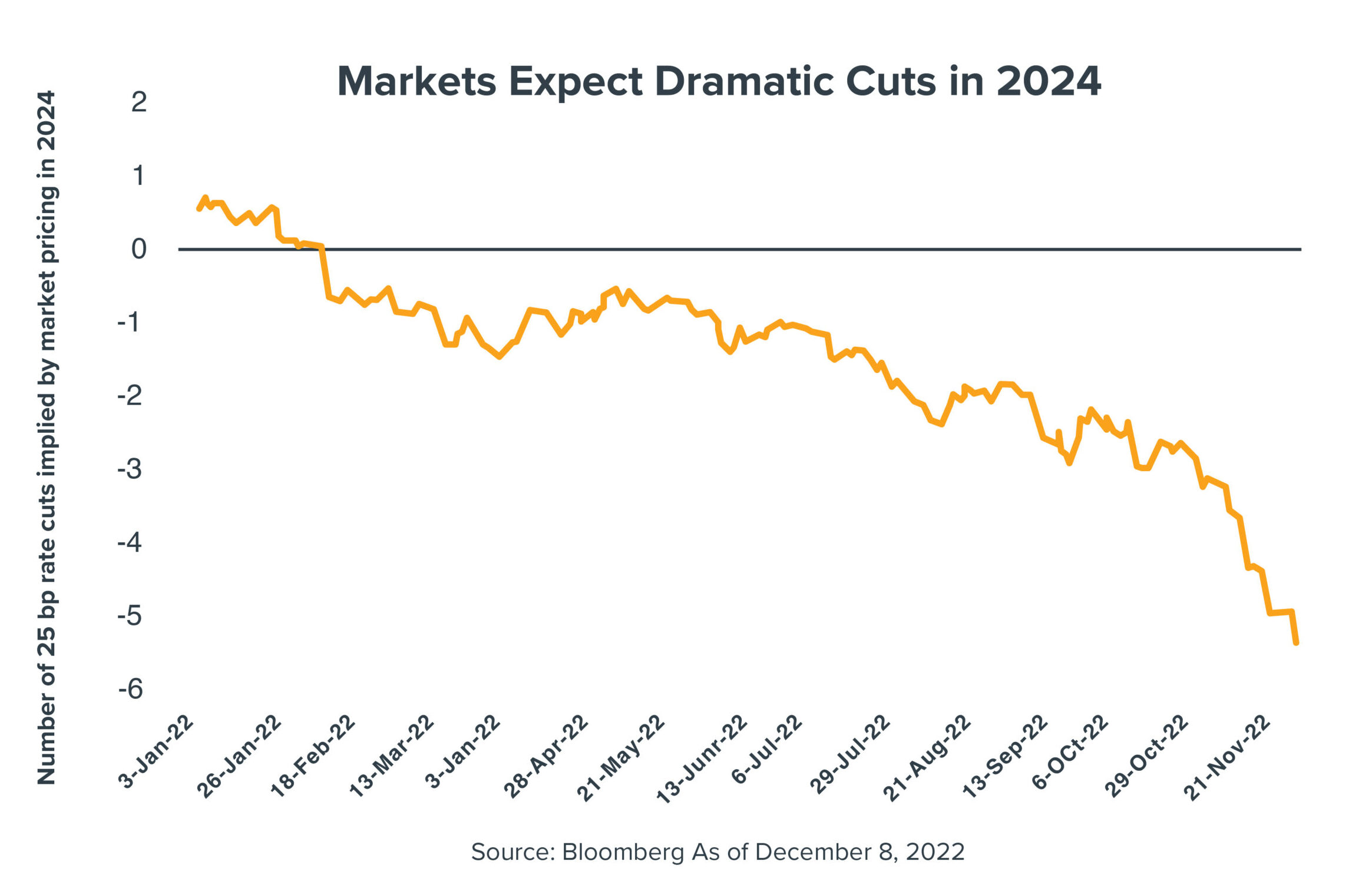Throughout 2022, investors have seen various positive economic developments as signs that the Federal Reserve Board was ready to pivot and end—or considerably scale back—its rate hikes.
In every case, they’ve run into a Fed that insists it still has plenty of work left to do to crush runaway inflation.
But hope springs eternal. The equity market’s most recent upswing has been fueled partly by investors’ burgeoning belief that the Fed will steer the economy to a true soft landing—taming inflation without causing painful unemployment or a full-on recession. Indeed, some leading indicators suggest a slowdown in inflation, and investors were heartened by Chairman Powell’s comments last week that the pace of interest rate hikes could slow as early as this month.
One result: Based on Eurodollar futures, the market is currently looking for almost six 25-basis point interest rate cuts in 2024. That would represent a swift reversal of the restrictive monetary policy investors have feared all year. Indeed, such a pivot toward supportive policy may be enough to stave off what is fast becoming a consensus recession call next year.

Trouble is, soft landings are hard to come by. According to research by Alan Blinder1, former vice chair of the Federal Reserve, the Fed’s policy moves accomplished his definition of a “perfect” soft landing just once during the 11 times it raised rates from 1965 into 2019. In that single period—from the end of 1993 to April 1995—inflation hovered around 3%, real GDP did not decline, and unemployment remained at what was believed to be its natural rate at the time.
The good news: Blinder points out that most of those 11 periods saw relatively soft (but not perfectly soft) landings, with mild to moderate recessions. Ultimately, however, investors who expect the economy to come out of the current environment unscathed don’t have history on their side—and might be, once again, too sanguine about the future.
Alan Blinder. “Alan Blinder on Landings Hard and Soft: The Fed, 1965-2020.” Princeton University. February 11, 2022.
This commentary is written by Horizon Investments’ asset management team.
Past performance is not indicative of future results.
Nothing contained herein should be construed as an offer to sell or the solicitation of an offer to buy any security. This report does not attempt to examine all the facts and circumstances that may be relevant to any company, industry, or security mentioned herein. We are not soliciting any action based on this document. It is for the general information of clients of Horizon Investments, LLC (“Horizon”). This document does not constitute a personal recommendation or take into account the particular investment objectives, financial situations, or needs of individual clients. Before acting on any analysis, advice, or recommendation in this document, clients should consider whether the security in question is suitable for their particular circumstances and, if necessary, seek professional advice. Investors may realize losses on any investments.
This commentary is based on public information that we consider reliable, but we do not represent that it is accurate or complete, and it should not be relied on as such. Opinions expressed herein are our opinions as of the date of this document. These opinions may not be reflected in all of our strategies. We do not intend to and will not endeavor to update the information discussed in this document. No part of this document may be (i) copied, photocopied, or duplicated in any form by any means or (ii) redistributed without Horizon’s prior written consent. Forward-looking statements cannot be guaranteed.
References to indices or other measures of relative market performance over a specified period of time are provided for informational purposes only. Reference to an index does not imply that any account will achieve returns, volatility, or other results similar to that index. An index’s composition may not reflect how a portfolio is constructed in relation to expected or achieved returns, portfolio guidelines, restrictions, sectors, correlations, concentrations, volatility or tracking error targets, all of which are subject to change. Individuals cannot invest directly in any index.
Other disclosure information is available at hinubrand.wpengine.com.
Horizon Investments and the Horizon H are registered trademarks of Horizon Investments, LLC
©2022 Horizon Investments LLC

